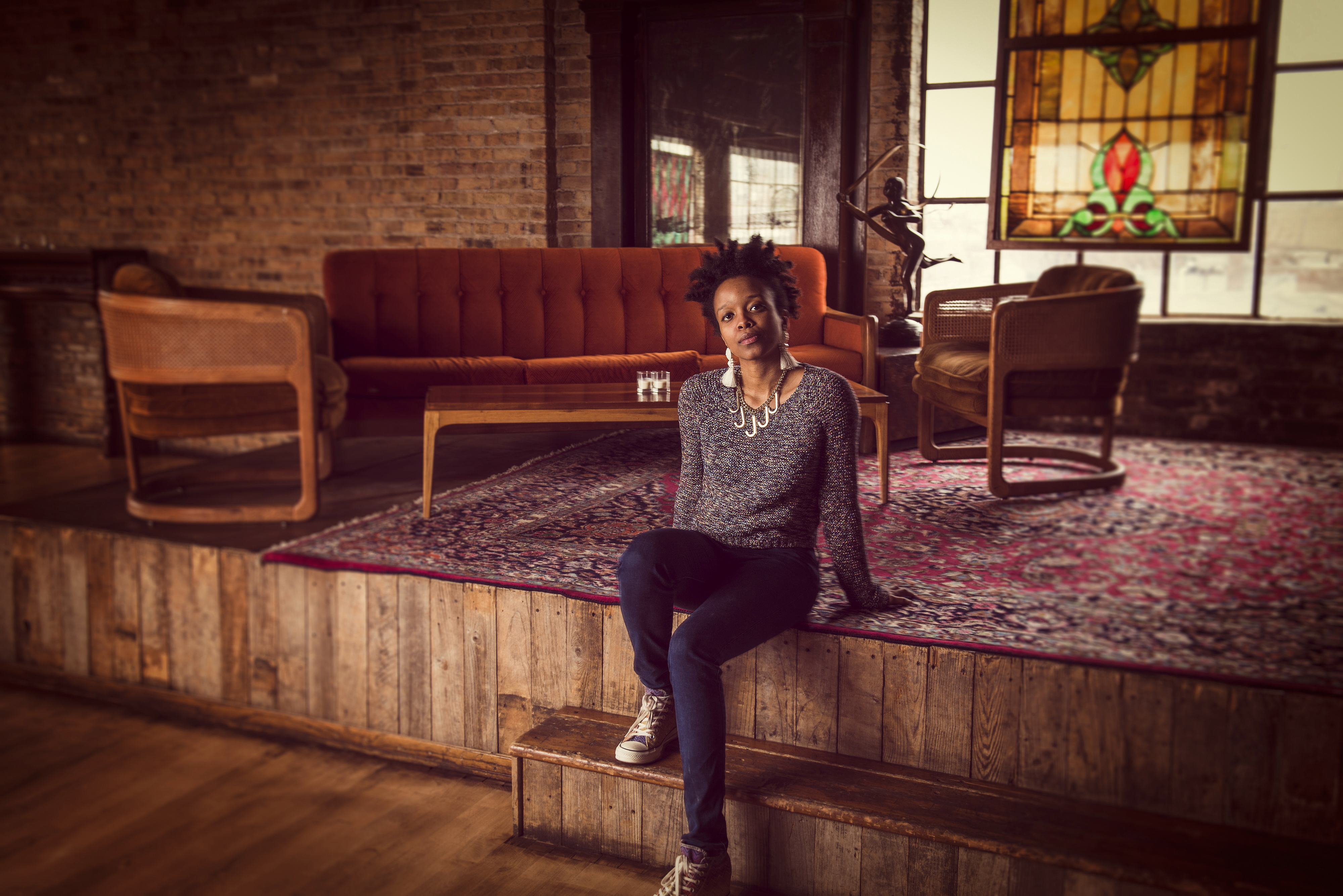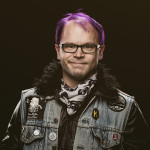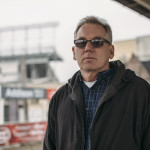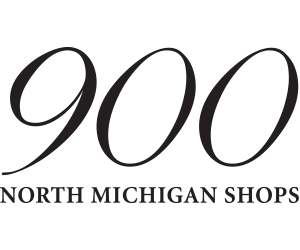Interview by Leor Galil
Photos by Bill Whitmire
I always loved singing and dreamed of being a singer—hairbrush-in-front-of-the-mirror-type aspirations. I grew up singing in my grandma’s church, they had a children’s choir there, and I got a lot of solos. You could be singing whatever notes and the people will support you, so it was a really uplifting, affirming experience.
Poetry gave me the confidence to consider myself an artist. I got into poetry in high school. I did a Gallery 37 program, part of After School Matters. Maggie Daley was really into funding it, and so you got paid a really good stipend as a 14-, 15-year-old person.
Why I still work at Young Chicago Authors and work with the spoken word and young people—it empowers you as a young person to understand that your voice can have impact. That impacted my whole trajectory after that. When I was choosing colleges I was like, “Which college is gonna have a spoken-word scene?” That led me to choose Brown. From there I thought my plan would be to major in something that was gonna get me a real job that would allow me to do poetry. But it flipped, and I became more confident in the idea of myself as an artist or teaching artist.
My dad is a physician, pediatrician, always has worked at Cook County. My mom is more of an alternative-medicine doctor—she does reiki, leads meditation. They were really receptive, especially my mom. I feel like in her heart she has always been an artist and a healer. She plays acoustic guitar, and we grew up with her teaching us how to play, or singing songs she wrote. I remember putting my head against the guitar and hearing the sound reverberate, putting my head against her back and listening to her voice—it was the most beautiful thing. When Louder Than a Bomb was starting a college slam, I came home for the very first slam. The poem that I did was called “Apocrypha,” and it’s about HIV-AIDS and the black community. I do this thing where I talk backwards in it—kind of like a play on words, talking about how you can’t speak about this issue and rewinding my words into my mouth.
When Louder Than a Bomb was starting a college slam, I came home for the very first slam. The poem that I did was called “Apocrypha,” and it’s about HIV-AIDS and the black community. I do this thing where I talk backwards in it—kind of like a play on words, talking about how you can’t speak about this issue and rewinding my words into my mouth.
A lot of people think slam poetry a joke—“It’s just people yelling at you.” I had a very quiet energy. I remember one of my mentors being like, after the performance, “You don’t sound like anyone else.” I really held on to that as “You can be confident in your own voice.”
One of my mentors, Selly Thiam from Gallery 37—we were practicing in her kitchen. I was reading this poem that was one of those things where you write a poem about a story that didn’t happen to you. I had this poet voice, this inflection that wasn’t natural. I would start it and she would say, “Start over. That’s not your voice.” Over and over, and I started crying. Eventually, she was like, “Yes, that’s you. Never use any other voice than that.”
“There’s a transcendence that music has that poetry doesn’t necessarily always have.”
As soon as I got a laptop at the end of high school and discovered GarageBand I was experimenting with that. I think it really just took Owen Hill, my friend from Brown, having the confidence to say, “We’re gonna start a band.” I was kinda like, “Yeah, sure, let’s do this in our free time.” But he was very much, “No, this is our next big thing.”
That first M&O record, we had no fan base. We were just in this studio-space warehouse thinking about what was on our minds and what we were feeling. That’s a really cool space to have when you’re just starting out.
There’s a transcendence that music has that poetry doesn’t necessarily always have. For me, I really think about young black girls, especially with this [solo mixtape] project; I’m really thinking of my former self, or my sisters, as my audience. It’s like what Toni Morrison said: she writes the books that she wishes she had to read. I also think about, like, the protests last night, and it’s a very traumatic thing. I want my music to be that elixir that keeps people able to stay woke, and also stay healthy and loving themselves.
I have to shout out youth programs. It was Gallery 37 at After School Matters that took us on a field trip to Young Chicago Authors. I fell in love with WordPlay, the longest-running open mike in the city. I’ve never seen young people listening to each other in that way before—just respecting each other and caring. That’s when I fell in love with that community.
People have started to realize how instrumental Young Chicago Authors has been—and other spaces like YouMedia—in fostering this community of musicians. Chance [the Rapper] and Vic [Mensa] and Saba—all these people know each other through this pseudo poetry/rap-music community. Louder Than a Bomb is a big part of that too. There’s a longevity to these youth arts spaces, so even when you’re no longer a youth there’s a space for you.
We’re identifying the next crew of young leaders. We have this really great program called Louder Than a Bomb Squad, where over the summer we get to work intensely with 12 students who came through Louder Than a Bomb, and they get to do their own individual artistic projects.
It’s a relatively new phenomenon, noticing the intersection between the poetry and hip-hop communities and being conscious of the ways I can provide space for women of color within that. There’s a space that got started at YCA called Lady Church, started by Kush Thompson and Jasmine Barber for women poets. I want to create a space that’s for women of color in the music industry.
The Dark Noise Collective—there’s six of us altogether. We formed after graduating college and realizing in the literary world it can be very hard to be a poet of color. There’s just all of these microaggressions and barriers to publication. So we wanted to have a way to troubleshoot these things together.
 I felt very weird and out of place in every other context except for the poetry context. Growing up in Beverly, my family was one of the only black families when we first got there. When I’d go to church with my grandma I was clearly very different from the other black people at my church because I’m from Beverly and I come from a different background. In my high school, Saint Ignatius [College Prep], same culture shock—very north side, not that many people from the south side, not that many people of color. Having that constant experience of being the only, or the outside, and then having the experience of a room full of people who are being honest about how they feel—that was really formative, and that influences my ability to, like, not give a fuck as much in my art.
I felt very weird and out of place in every other context except for the poetry context. Growing up in Beverly, my family was one of the only black families when we first got there. When I’d go to church with my grandma I was clearly very different from the other black people at my church because I’m from Beverly and I come from a different background. In my high school, Saint Ignatius [College Prep], same culture shock—very north side, not that many people from the south side, not that many people of color. Having that constant experience of being the only, or the outside, and then having the experience of a room full of people who are being honest about how they feel—that was really formative, and that influences my ability to, like, not give a fuck as much in my art.
For Donne Trumpet & the Social Experiment’s “Sunday Candy”—the beat just felt like nostalgia, it felt happy, felt like the type of happy where you’re almost crying. That makes me think of church and my grandma and love and loving someone. So I wrote that hook without thinking of what Chance might connect to it, and so it was just interesting to see how that all played out.
I want to shift focus into producing more work, focusing on getting a manuscript together for my book, and finishing my mixtape. Seasonally this is the period to hibernate and create stuff, so I’m excited for that. v



